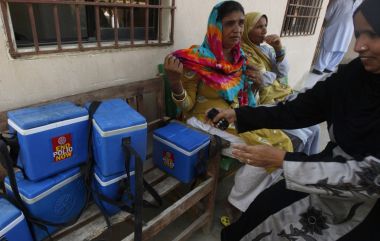'They're poisoning us'. How religious leaders are hindering vaccination programmes across the world

When it comes to vaccination, religious leaders have not always been on the side of the angels.
While Church health programmes have often been in the forefront of the practice, vaccination has also been viewed with suspicion by fundamentalists and conspiracy theorists – albeit sometimes with good reason.
Arguably, the latest example of this is to be found in Kenya, where Roman Catholic bishops have urged people not to be vaccinated against tetanus on the grounds that the vaccine has been laced with a contraceptive drug.
The vaccine is aimed at women in their childbearing years and the bishops say that it is being used as a population control measure.
However, the World Health Organisation (WHO) and UNICEF, which are running the programme to immunise 2.4 million women, expressed in a statement for Christian Today their "deep concern about the misinformation circulating in the media" about the vaccine.
The statement said: "The allegations are that the tetanus vaccine used by the Government of Kenya and UN agencies is contaminated with a hormone (hCG) that can cause miscarriages and render some women sterile. These grave allegations are not backed up by evidence, and risk negatively impacting national immunisation programmes for children and women."
Appearing before Kenya's parliamentary health committee, the bishops had reiterated concerns they first expressed in March about the vaccine, which they said was "laced" with beta human chorionic gonadotropin, a birth control hormone.
Bishop Paul Kariuki, chairman of the Kenya Conference of Catholic Bishops' health committee, said: "We are calling on all Kenyans to avoid the tetanus vaccination campaign because we are convinced it is indeed a disguised population control program."
The bishops said that they had had the vaccine tested privately and that the presence of the hormone had been revealed. In an interview with the Catholic agency CISA in Nairobi, Dr Stephen Karanja, president of the Kenya Catholic Doctors Association, said: "What is immoral and evil is that the tetanus laced with hCG was given as a fertility regulating vaccine without disclosing its contraceptive effect to the girls and mothers,"
However, the WHO/UNICEF statement questioned the validity of the tests and said that the vaccines were safe.
In their statement in March, the bishops criticised what they said was a lack of consultation and information about the vaccine and asked why the campaign was targeted specifically at women aged between 14 and 49. The WHO/UNICEF statement said that it was because most tetanus cases in Kenya were among newborns, hundreds of whom died every year from the condition.
Following the bishops' intervention, Kenya's Ministry of Health has established a commission of inquiry into the tetanus vaccination campaign.
Similar claims have been made before about tetanus vaccines and birth control relating to campaigns run by the WHO in Nicaragua, Mexico and the Philippines.
The Kenyan claims, however, highlight a wider issue around the influence of religious leaders on vaccination programmes. In the early 2000s, leaders in Northern Nigeria advised followers not to have their children vaccinated against polio, resulting in a setback for attempts to eradicate the disease. They also advised against the measles vaccine; in the first three months of 2005 Nigeria suffered 20,000 measles cases and 600 deaths. In 2007, 200 children died in an outbreak in Borno State.
Taliban leaders in Pakistan and Afghanistan have also opposed vaccination programmes, denouncing them as an American ploy to sterilise Muslim women. Vaccination programme leaders have been assassinated.
The attempt to eradicate polio in Pakistan, where it is still endemic, received a major setback because of the CIA's use of a hepatitis vaccination programme to locate Osama bin Laden in 2011. A local doctor, Shakil Afridi, obtained samples of the DNA of children in bin Laden's Abbottabad compound and helped identify his hiding place. US intelligence agencies announced in May that they would end the practice, a move welcomed by health officials there. Dr Nima Abid, a senior official with the World Health Organisation in Islamabad, said then: "It is good news. If they stick to it then it will help with convincing people that vaccines are not part of a conspiracy," Dr Nima Abid, a senior official with the World Health Organisation in Islamabad, told ABC news.
"At the time it was really bad for all our immunisation programs. It hurt us a lot. Health programs should never be used as a front for intelligence agencies. It undoes all our work and puts our people at risk."
More recently, campaigners in Pakistan have claimed a breakthrough in engaging Muslim leaders in the anti-polio cause, with the influential Jamiatur Rasheed madrassah declaring its support.











